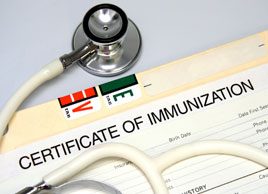8 immunizations for adults
While the new H1N1 flu virus, or swine flu, may be dominating the headlines lately, that’s not the only thing we need to protect ourselves from. Here are eight immunizations all adults should consider.

Source: Best Health Magazine, October 2009
‘Immunization is important throughout our life,’ explains Dr. Bonnie Henry, an epidemiologist with the B.C. Centre for Disease Control and chair of the Canadian Coalition for Immunization Awareness and Promotion. Not only are we at risk of contracting measles, mumps, tetanus, pneumonia, chicken pox and other diseases if under-immunized, but we can also infect others.
According to the World Health Organization, it’s an efficient strategy for controlling and eliminating life-threatening infectious diseases. A century ago, such acute illnesses were the leading cause of death in Canada; today, fewer than five percent succumb. Yet a 2008 Leger Marketing survey noted that more than 50 percent of us had not spoken to a healthcare professional about adult immunizations.
This lack of knowledge about what shots we may need has translated into poor compliance. The most recent Canadian Adult National Immunization Coverage Survey, conducted in 2006, reported that 37 percent of adults age 18 to 64 with chronic medical conditions received the flu vaccine in 2005-2006 (the target is 80 percent by 2010). With new vaccines on the way’for example, one for shingles (or herpes zoster, a viral infection often causing a painful rash) will be available to those over age 60 by the end of this year’it’s time to make discussing immunizations part of our yearly checkup.
Our list is adapted from the Canadian Immunization Guide 2006 and applies to those over age 18. Watch for an updated version in 2010; in the meantime, check the National Advisory Committee on Immunization‘s website for updates on specific vaccines. If you are severely allergic, pregnant, acutely ill with fever or immunosuppressed, check with your healthcare provider to discuss what is right for you, and any possible side effects (the most common are pain and swelling at the injection site, mild fever, headaches and nausea). Booster shots’a smaller second dose’are needed with some vaccines.
Vaccines for those over age 18
Tetanus, Diptheria, Pertussis (whooping cough)
Who should get them: Everyone.
How often: Every 10 years; one time should include pertussis. Requires a booster shot.
When not to get them: You are severely allergic to the vaccine.
Influenza (flu)
Who should get them: Anyone, but especially those at high risk, e.g., have asthma or lung disease.
How often: Each fall.
When not to get them: You are severely allergic to the vaccine or have an accute illness accompanied by a fever.
Pneumococcal (pneumonia)
Who should get it: Those at high risk, e.g., have heart disease or diabetes.
How often: Once in adulthood (the Guide isn’t specific about age or time of year).
When not to get it: You are severely allergic to the vaccine.
Hepatitis A
Who should get it: Those at high risk, e.g., have liver disease.
How often: Once in adulthood (the Guide isn’t specific about age or time of year).
When not to get it: You are severely allergic to the vaccine.
Hepatitis B
Who should get it: Those at high risk, e.g., work in a healthcare facility.
How often: Once in adulthood (the Guide isn’t specific about age or time of year).
When not to get it: You are severely allergic to the vaccine.
Meningococcal (meningitis)
Who should get it: Those at high risk, e.g., a student living in a dorm.
How often: Once in adulthood (the Guide isn’t specific about age or time of year).
When not to get them: You are severely allergic to the vaccine.
Measles, Mumps, Rubella (MMR)
Who should get it: Those who have never had the vaccine or any of the diseases, or were born in or after 1970.
How often: Once in adulthood. Due to measles and mumps outbreaks, a booster is recommended.
When not to get it: You are pregnant or are immunosuppressed, e.g., undergoing chemotherapy.
Varicella (chicken pox)
Who should get it: Those who have never had the vaccine or the disease.
How often: Once in adulthood.
When not to get it: You are pregnant or are immunosuppressed, e.g., have AIDS.
This article was originally titled "Your best shots," in the October 2009 issue of Best Health. Subscribe today to get the full Best Health experience’and never miss an issue!’and make sure to check out what’s new in the latest issue of Best Health.




